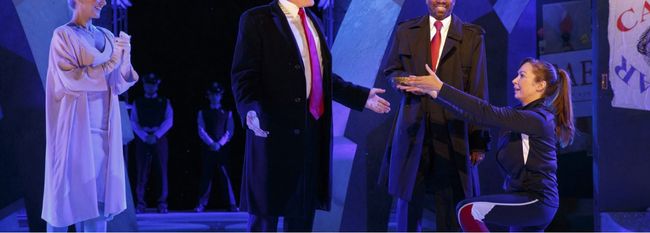Jim Petosa commentary on the ARTery: Revisiting ‘Julius Caesar’ — Theater In The Age Of Trump

June 16, 2017 (originally published by The ARTery)
By Jim Petosa
“Ambition’s debt is paid!”
So cries one of the conspirators moments after the death of Julius Caesar in Shakespeare’s play. It is uttered as a slogan, a moral summation to an act of violence that the speaker believes is as inevitable as it is just.
The line in performance is most likely shouted with assurance and conviction by the actor. And, most importantly, it must illuminate a moment that depicts moral certainty when such certainty is far from universally accepted.
Great tragedy is born from such a moment of conflict and chaos. A tragic fall, while a clear diminution of a character’s moral status, is still a fall — something that throws us off-balance, experienced as a surprise, even though we are forewarned (in this case, repeatedly, by a soothsayer). And yet, it hangs in the air with the starkness of its own inevitability.
In “Julius Caesar,” Shakespeare uses the Roman republic’s deified emperor to explore the tragedy of those who used villainous means to exert their justified ends — only to be enmired in the destructive chaos they created, which does little to resurrect their beloved republic.
Like all great plays, “Julius Caesar” finds its potency in its time of revival. All productions intersect in at least three points: the time of their writing, the time they are depicting and the time of the production at hand. In my lifetime, I have seen or read about interpretations of the play that make potent use of this temporal tension. I’ve seen a Washington, D.C.-based version of the play that cast the morally conflicted and debased former “mayor for life” Marion Barry in the title role. We’ve read about the 2012 Guthrie Theater production that featured an Obama-esque actor. We’ve seen fascist, socialist and corporate Caesars. There’s really no end to how the character of Caesar can be used to create a sociological mirror that reflects and refracts the play and its historic moment as a means to understanding some present time.
Shakespeare’s plays provide ripe opportunities for such interpretive musings. Consider Barbara Garson’s “MacBird!” Written in 1967, the satire revisited Shakespeare’s “Macbeth” in the post-JFK assassination era that skewered LBJ by imagining him as the conniving title character. In performance, Ian McKellen’s Richard III exuded a spidery Nazi creepiness to memorable effect. The mirrors of interpretation collude with the mirrors of history and/or current events in ways that theater artists and audiences have been evoking for years.
Two years ago, a Donald Trump-inspired Julius Caesar might have been the stuff of farce, owing more to Aristophanes and Molière. Somewhere down the road, such farcical treatment may be where the current saga finds its resolution. But, now, five months into this young, unpredictable presidency, we don’t seem to be farcing around. This is serious.